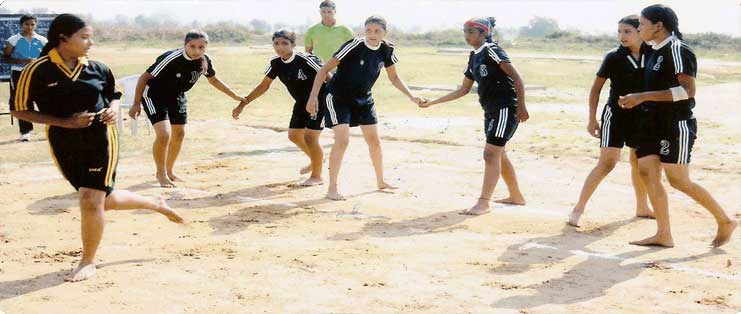
History Of Circle Kabaddi Game In Hindi
CIRCLE KABADDI History and development Circle Kabaddi is the regional sport of the and was referred to as Punjabi Kabaddi in. However, with the formation of the states of and Punjab in, the same game was referred to as Punjab Kabaddi and Haryana Kabaddi also. History and development. Kabaddi is the regional sport of the Punjab region and was referred to as Punjabi kabaddi in India and Pakistan.However, with the formation of the states of Haryana and Punjab in India, the same game was referred to as Punjab kabaddi and Haryana kabaddi.
At the Country National team(s), a that originated in, is one of the most popular sports in India, played mainly among people in villages. India has taken part in four in kabaddi, and won gold in all of them. Four forms of kabaddi played in India are Amar, Suranjeevi, huttuttoo, and Gaminee. Amar is generally played in Punjab, Haryana, the United States, Canada, and other parts of the world, mostly by Punjabi sportsmen.
Suranjeevi is the most played form of kabaddi in India and the world. This is the form used in international matches generally and played in Asian Games.
Huttuttoo was played by men in Maharashtra State. People playing Kabaddi at the beach. Modern kabaddi is a synthesis of the game played in various forms under different names. Kabaddi received international exposure during the 1936 Berlin Olympics, Hanuman Vyayam Prasarak Mandal, Amaravati, Maharashtra. The game was introduced in the Indian Olympic Games at Calcutta in 1938. In 1950 the All India Kabaddi Federation came into existence and compiled standard rules.
The Amateur Kabaddi Federation of India (AKFI) was founded in 1973. After formation of the Amateur Kabaddi Federation of India, the first men's nationals were held in Tamil Nadu(Madras)(renamed Chennai), while the women's were in AKFI has given new shape to the rules. The Asian Kabaddi Federation (AKF) was founded under the chairmanship of kabaddi. In 1979, a return test between Bangladesh and India was held at different places of India including Mumbai, Hyderabad, and Punjab. The Asian Kabaddi Championship was arranged in 1980 and India emerged as champion and Bangladesh runner-up. Bangladesh became runner-up again in 1985 in the Asian Kabaddi Championship held in Jaipur, India. The other teams in the tournament were Nepal, Malaysia and Japan.
Some of our partners may use cookies on our site (for example, advertisers). Please note that disabling the cookie feature on your browser or deleting cookie files from your computer will render you unable to access certain features on eenadu.net, as the use of cookies is a necessary part of the eenadu.net net technology. News paper eenadu. Eenadu.net uses cookies only to: • Provide its services • Deliver content specific to your interests • Save your password (so you do not have to re-enter it each time you visit different pages on our site) and for other purposes. We CANNOT access any information not sent by eenadu.net. Please note: Cookies are used only to recollect information sent to your computer from eenadu.net.
The game was included for the first time in the Asian Games in Beijing in 1990. India, China, Japan, Malaysia, Sri Lanka, Pakistan, and Bangladesh took part.
India won the gold medal and has also won gold at the following six Asian Games in Hiroshima in 1994, Bangkok in 1998, Busan in 2002, Doha in 2006 and Guangzhou in 2010. An attempt to popularise kabaddi in Great Britain was carried out by Channel 4, who commissioned a programme dedicated to the sport. The programme, kabaddi in the early 1990s, however, failed to capture viewer attention despite fixtures such as West Bengal Police versus the Punjab. Kabaddi was axed in 1992. Alt-rock band formed a kabbadi team in 2001 and were, at one stage, ranked seventh in the British domestic standings.[10] [better source needed] In the 1998 Asian games held at Bangkok (Thailand), the Indian kabaddi team clinched the gold medal.
The chief coach of the team was former kabaddi player and coach Flt. In a major upset, seven-time gold medalist India suffered their first ever loss in 28 years at the to South Korea in the men’s Kabaddi group A game. In the semi-final, Iran sent the seven-time Asiad champions packing with a 27-18 win. India, who took home the bronze for reaching the semi-finals, did not play in the final since the introduction of the Games in the Asiad in 1990 at Beijing. Variation [ ] Standard style [ ] In the international team version of kabaddi, two teams of seven members each occupy opposite halves of a field of 10 by 13 metres (33 ft × 43 ft) in case of men and 8 by 12 metres (26 ft × 39 ft) in case of women. Each has three supplementary players held in reserve. The game is played with 20-minute halves, with a 5-minute halftime break during which the teams exchange sides.